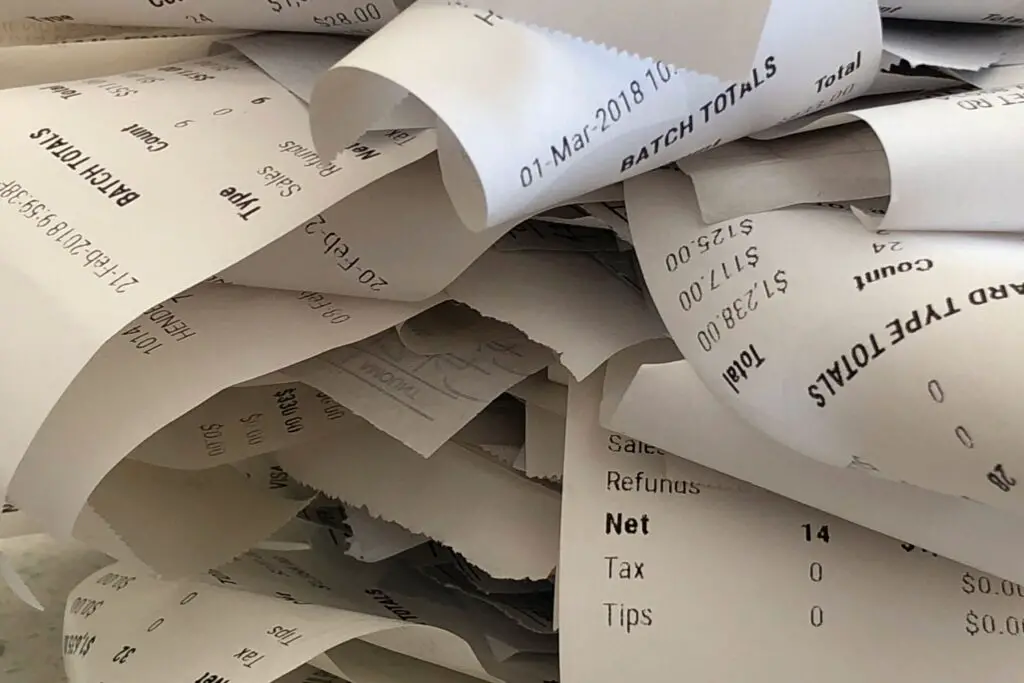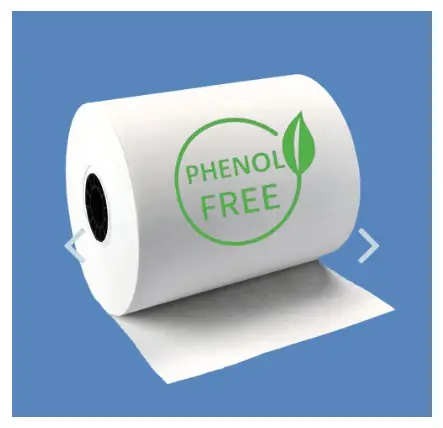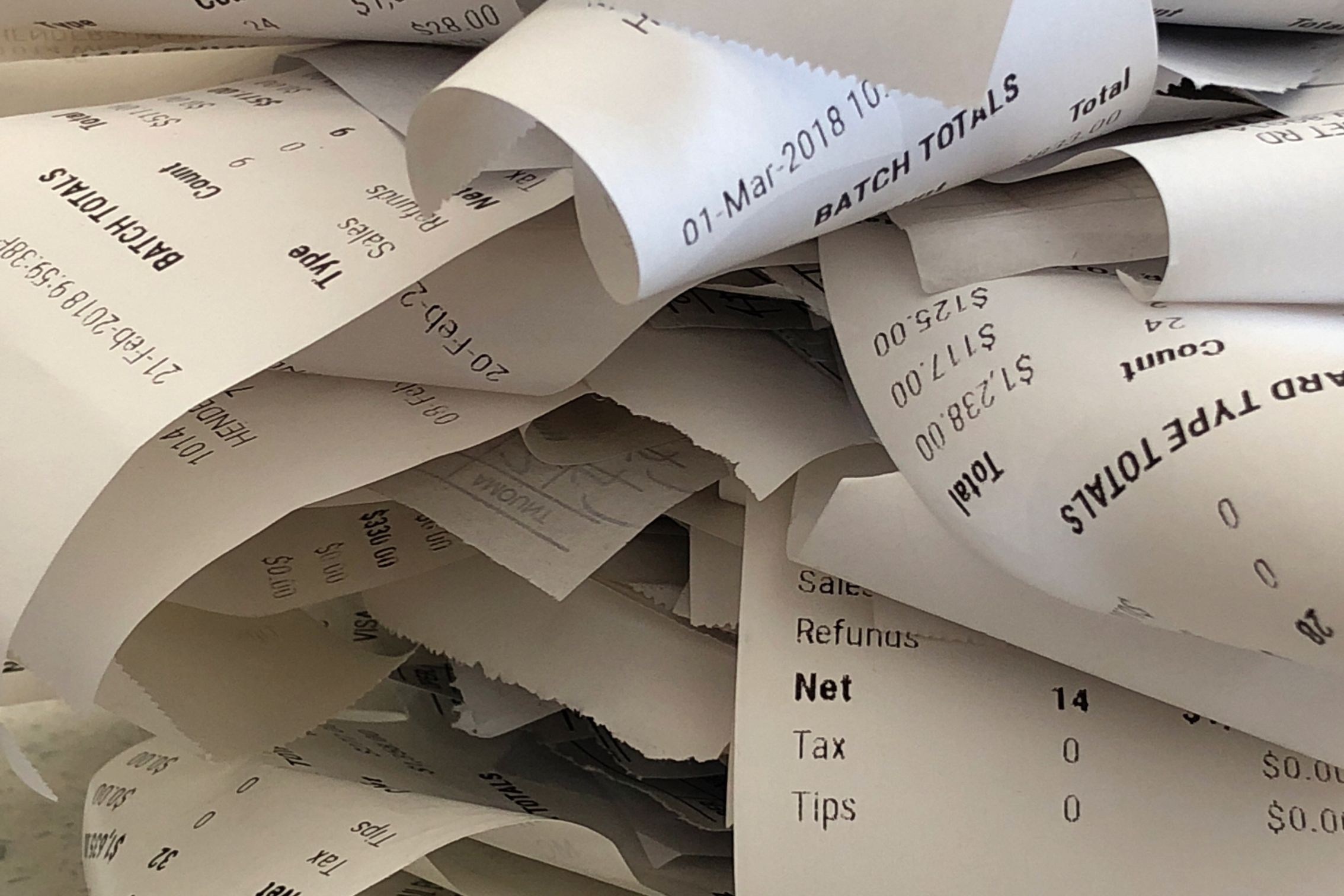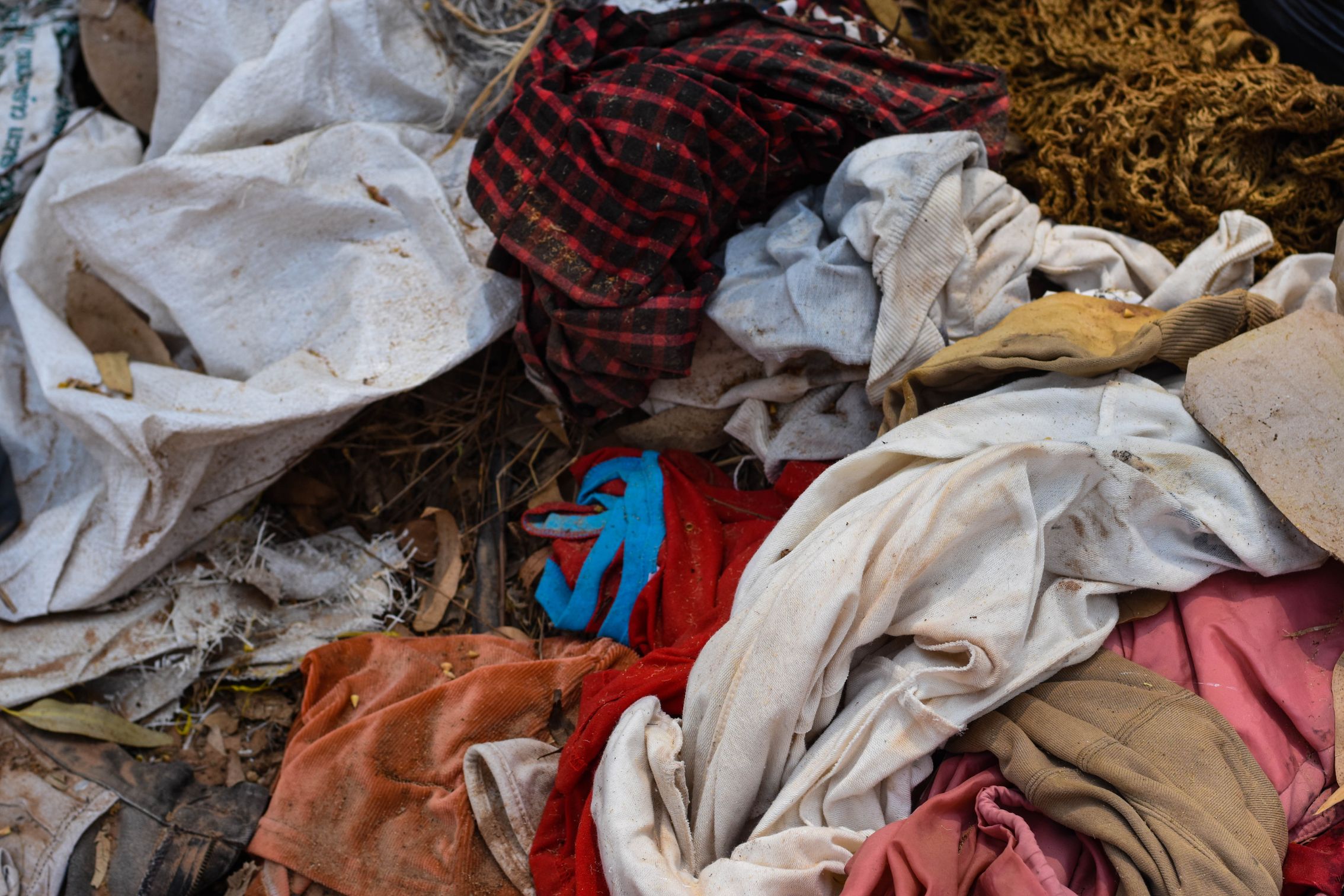Thermal Paper Recycling
– Get Rid of Reciepts Safely

This post was last updated in 2024
Hello there my eco-conscious warriors 😊
As the one responsible for all the finances in the household, sorting through receipts falls on my plate.
I have a system in place to deal with it all but after sorting and storing digital copies of my receipts, I am left with a bunch that I need to get rid of. And of course, I want to get rid of them responsibly.
Surprisingly, I’m not the only one. Receipts was one of those items that people on Instagram were interested in hearing about when I was doing my decluttering challenge. So I have taken it upon myself to document a few things that I have learnt about recycling, composting and getting rid of receipts. But most people want to know – can you recycle receipts:
Thermal paper receipts, commonly used in cash registers, are not accepted for recycling. This is because they often contain Bisphenol A (BPA) or Bisphenol S (BPS), chemicals that are unwanted in the recycling process. This is why it is recommended to throw thermal paper receipts into landfill.
In this blog post, I cover the ins and outs of tihs and more, while covering the following topics:
Click on the question that interests you or keep reading on.
What do you do with old receipts?
If you have old receipts on hand that you want to get rid of you will need to determine what type of paper they are printed on. If it is printed on thermal paper, it will need to go into landfill. If it is not printed on thermal paper, it can be recycled or composted.
More about recycling and composting receipts can be found below. And if you want to know how to determine what kind of paper the receipt was printed on, this is also covered below.
But there is one thing that needs to be covered first if you want to understand the ins and outs of getting rid of receipts…
What is BPA and BPS?
Bisphenol A (BPA) is a synthetic compound used in the production of polycarbonate plastics and epoxy resins and it is present in thermal paper, which is typically used in receipts. Bisphenol S (BPS) has been used as an alternative to BPA in certain products, including thermal paper used for receipts.
Most receipts are printed on thermal paper, which has a BPA-coated layer on one side serving a role in colour development during printing.
Issues arose in the early 2000s when it was found that BPA can out leach from polycarbonate plastics, can linings and thermal receipts. This presents an exposure risk. A concern when it comes to food packaging and the food we consume but it is also a concern when it comes to receipts.
Receipts are handled by hand so there is a direct exposure risk through skin contact.

I recently went on a tour in a test lab testing for hazardous substances and one key takeaway was that our skin offers very little protection when it comes to hazardous chemicals. It just soaks things in!
A chemist speaking to Science News Explores found that receipts could leach around 60 to 100 milligrams of BPA, which surpasses levels from polycarbonate bottles. And this can be absorbed by our skin.
BPA is a concern to many due to its potential to mimic the hormone estrogen, leading to worries about reproductive system disruption and potential links to cancer once this chemical enters our bodies. Furthermore, a study from the University of Iowa found that high levels of BPA exposure are associated with an increased risk of long-term all-cause mortality.
And there is the fact that in 2020 Europe banned the use of BPA in thermal paper due to concerns about overexposure of the chemical to people’s health.
In Australia and other countries, advocacy groups have called for BPA labelling on receipts, particularly to raise awareness among pregnant women and individuals handling receipts, but no such labelling exists.
Why? Likely because the exposure risk is considered to be very low. Yes, there is exposure, but not at a level that we need to be concerned about.
At least, that is the position when it comes to BPA in food packaging and it is likely the thinking around receipts.
Also, there is the fact that BPA does not accumulate within the body as the biological half-life of BPA in adults (how long it takes for half the amount to disappear over time) is around 2 hours. So the risk of it causing cancer is considered low.
Added to this is the fact that a study found urinary BPA concentrations in subjects who continuously handled receipts for 2 hours without gloves (5.8 μg/L) were lower than those who consumed canned soup consumption (20.8 μg/L).
This kind of contradicts the earlier statement I noted, where receipts have been found to leach 60 to 100 milligrams of BPA, leading me to be thoroughly confused on this issue.
After bowing down to public pressure, Coles and Woolworths have moved away from using thermal paper made with BPA. Instead, they are likely (not confirmed) using thermal paper made using BPS – a common BPA substitute.
Does this make things better?
Well, BPS performs the same function as BPA and it was considered a safer alternative to BPA because it was thought to have less potential for endocrine-disrupting effects.
Despite being considered a potentially safer alternative, studies have shown (including this one from Environmental Health Perspectives) that BPS exhibits estrogen-mimicking behaviour similar to BPA. Another study by Oakland University School of Health Sciences, confirm confirmed BPS’s estrogenic effects on breast cancer cells, again suggesting it can act as an endocrine disruptor.
This is just a mess!
It’s such an unregulated space in Australia. Other than its use in baby bottles, there are no restrictions on how BPA and BPS are used and what information is disclosed to us.
You could attribute the lack of regulation to mean that all is good, nothing to worry about here.
But I wonder about the issues raised in this article by Chem Trust. They examined the road that led to the EU ban and the lessons learnt through that process and found regulators place too much of a burden on proving harm rather than proving safety. That, along with other points they raised, could explain why there is a lack of action in Australia.
My conclusion, I think it is best to limit your exposure to receipts.
Want some tips on this? Check out this article: https://pandapaperroll.com/7-tips-use-thermal-receipt-paper-healthily/
Can you recycle receipts in Australia?
Thermal paper receipts, commonly used in cash registers, are not accepted for recycling. This is because they often contain Bisphenol A (BPA) or Bisphenol S (BPS), chemicals that are unwanted in the recycling process. This is why it is recommended to throw thermal paper receipts into landfill.
While the paper could be recycled, these chemicals can not flow into the recycling process because the resulting product would be contaminated with BPA and BPS.
As noted in an article in the Huffington Post “The presence of BPA and BPS in receipts also complicates recycling. Technically, thermal paper receipts — with their telltale sheen of coating — are recyclable just like any other paper. But because of the bisphenol content, many cities consider the shiny strips contaminants in the recycling stream.”
Why is it so undesirable? BPA and BPS can not be removed through the recycling process. And since recycled paper could be turned into toilet paper, napkins and other everyday items that come in contact with the skin, that’s a problem.
For that reason, it can’t enter the process to begin with.
Another important point is that the recycling of thermal paper can lead to the release of BPA and BPS into the environment. Paper recycling involves sludge and wastewater discharge. If receipts are thrown into the recycling stream, the wastewater discharge will likely contain BPA and BPS since they can not be removed in the recycling process.
This could be an issue (although as covered in the last section of this blog post, it may not be as big of an issue as these recycling companies like to make out).
As always, things aren’t always as clear cut as we would like them to be and that is true for thermal paper recycling.
Not all thermal receipts are made with BPA. For example, this phenol-free thermal paper sold by POS Supply Solutions in the US is both BPA and BPS-free:

Source: https://www.possupply.com/paper-rolls/thermal-receipt-roll-paper/phenol-free-thermal-paper-rolls
That being the case, these papers can be recycled.
Also, you can get receipts that are not printed on thermal paper at all. Some receipts are printed on regular paper, using dot matrix or inkjet printers. These receipts can be recycled.
So some receipts can be recycled – it’s only the receipts printed on thermal paper that can not.
Unfortunately, receipts aren’t labelled with the type of paper they are printed on. But there is an easy way to tell whether or not the receipt you have is printed on thermal paper or not.
How do I know if my receipt has BPA?
Your receipt is likely to have BPA if it is printed on thermal paper. How you can tell thermal paper from normal paper is through the scratch test – scratch the front and back of the paper and if the scratch leaves a black mark on either side, then you have thermal paper on your hands.
So if the paper leaves a dark mark when scratched, it’s a sign that the paper relies on BPA or BPS for printing. Keep this out of the recycling bin.
If there is no dark mark, it can be recycled.
To be honest, I don’t bother with this. I try to avoid taking receipts and if I do have receipts on hand, I don’t spend time scratching them – I just place them all into the landfill bin.
I draw the line at scratching receipts – in the bin they all go!
Yes, not doing the most eco-friendly thing here… especially when you consider that receipts could be composted…
Can you compost receipts?
While thermal receipts can not be recycled, they could be composted. BPA is the chemical of concern in receipts and this is unlikely to cause any health or environmental risks when placed in your garden soil. Of course, receipts printed on normal (not thermal) paper can go in your compost with no issues.
Does this surprise you?
Here is the reasoning and links to articles and studies that back this up:
- BPA has a short half-life in soil i.e. it takes a relatively short time to break down in soil (around 3 days).
- The molecules of BPA are a lot bigger than what plant roots can absorb i.e. plants won’t pick up these chemicals even if they were present in the soil as confirmed by this study and this study.
- As one article noted, you would get more BPA from handling a receipt and not washing your hands than you would by eating a strawberry grown from soil with composted receipts.
You will find numerous websites advising against putting receipts into compost (this and this for example) but there are no references to scientific reports on these websites.
So make of that what you will.
Frankly, I’m going to throw receipts into landfill.
Perhaps if I had a proper composting system going that churned through a lot of material I probably would throw some receipts in.
I have no reason to doubt that BPA does not persist in soil and it is not a mobile compound that can be easily taken up by plants. But for now, into landfill it goes.
Are receipts safe to throw away?
So looking at whether BPA can leach out of landfill and what that leachate contains…
A study in Japan found that the concentration of BPA in raw leachate tends to decrease as the years go by but how quickly that happens depends on the environmental conditions. BPA is considerably degraded by aeration. High temperatures also assist. Regardless, BPA concentrations do decrease. It is not a chemical that persists in the environment.
So what happens in the meantime, if it was to leach out and reach our waterways?
In a study published in Environmental Toxicology and Chemistry, it was found that BPA was degraded rapidly in surface waters taken from diverse locations in the United States and Europe. The study also referred to findings in a Japanese study that found that BPA-degrading microorganisms are widely distributed in nature. The conclusion was that BPA is not persistent in the aquatic environment.
What is surprising is the suggestion that paper waste with BPA can help prevent BPA from leaching into soil and waterways!
In this study published in the International Journal of Environmental Research and Public Health, they stated that paper waste was only a minor source of BPA leaching. Furthermore “it was an important factor in retarding BPA transformation, due to its BPA sorption.” That is, the paper containing BPA aided in absorbing and fixing BPA so it wouldn’t leach.
Much of this would hold for BPS, although there is evidence that BPS has a higher persistence in aquatic environments when compared to BPA.
All in all, it seems the level of contamination caused by paper receipts is minimal and the chance of these chemicals persisting in our environment is low. So you could argue that it is okay to throw your receipts into landfill.
Side note: If BPA and BPS in receipts is an issue you care about (I mean there are alternatives! Receipts shouldn’t be harming our health!) then this is an organisation you can look into: http://www.bpafree.com.au/
So there you have it. This summarises how I deal with receipts that come into the home, as well as some information on proper disposal.
Let’s hope more and more companies go towards phenol free receipts as we move into the future but all we can do in the meantime is ensure we get rid of these responsibly, because it is through these conscious actions, we can collectively work towards a more sustainable future 🌎
xxx Tahsin
A Heads Up: This post contains affiliate links that may earn me a small commission at no additional cost to you. Also as an Amazon Associate, I earn from qualifying purchases. I only recommend products and services that will help you take steps towards a more sustainable life and will never recommend anything that does not align, in some way, with these values.




